London’s free sheet newspaper Metro has spun a pro-Brexit, anti-sugar tax warning by the pub chain J.D. Wetherspoon as anti-Brexit news, even inventing a fake “profit warning” along the way.
The newspaper published an article entitled: “Pro-Brexit JD Wetherspoon issues profit warning after being hit by rising costs”, implying a link between Brexit, the chain, and its rising costs.
But the chain made clear in its statement this week — as well as numerous statements by Chairman Tim Martin — that a warning over rising costs via the sugar tax, increased staff pay, and utilities costs were not related to Brexit.
In fact, the chain announced strong results for the first quarter of 2018, posting a 36.1 per cent rise in pre-tax profit to £54.3 million, with an increased revenue of £830.4 million. The chain also said like-for-like sales rose by 6.1 per cent.
A statement by Martin said: “The company anticipates higher costs in the second half of the financial year, in areas including pay, taxes and utilities. In view of these additional costs, and our expectation that growth in like-for-like sales will be lower in the next six months, the company remains cautious about the second half of the year.”
The sugar tax — set to be fully implemented in April — is expected to lead to rising costs of between 18 and 24 pence per litre, dependent on the amount of sugar added to a drink.
More fake Brexit news as @MetroUK tries to link Brexit to rising costs, despite @jdwtweet making it clear the rising costs are because of utilities, staff salaries, and the sugar tax…. pic.twitter.com/jEASqNZ1O3
— Raheem Kassam (@RaheemKassam) March 16, 2018
Martin also blasted the European Union and the doomsayers of Brexit in his statement:
Another frequently repeated Brexit concern is that the much bigger EU economy will be better able to withstand a Mexican standoff than the UK.
This is also a fallacy. For example, Wetherspoon is one of the biggest customers, or possibly the biggest customer, of the excellent Swedish cider-maker Kopparberg. If trade barriers were imposed, so as to make Kopparberg uneconomic, then Wetherspoon could switch to UK suppliers or those from elsewhere in the world.
In this case, the principal losers in a trade war would be the inhabitants of a small town in Sweden, where Kopparberg is produced, rather than the UK economy. Unfortunately for the Swedes, the EU negotiators, unlike those of the UK, are not subject to judgement at the ballot box, so Kopparberg’s influence on the outcome may be minimal.
The same principle applies to thousands of EU imports including Prosecco, Champagne and many wines and spirits – in almost all cases there are suitable, and often excellent, alternatives to EU products available elsewhere.

COMMENTS
Please let us know if you're having issues with commenting.